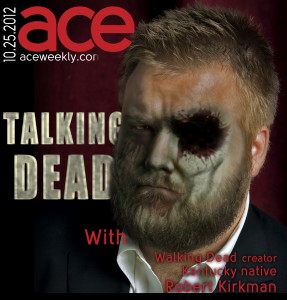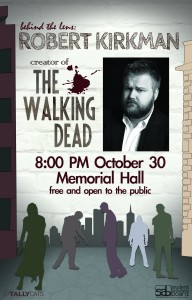BY EVAN O. ALBERT
Two episodes into Season 3 of AMC’s zombie rating juggernaut The Walking Dead, and a week before creator Robert Kirkman will take the stage for his Behind the Lens lecture at UK’s Memorial Hall, it’s time someone asked him the question, “what was it about growing up in Kentucky that inspired you to create this apocalyptic survival fiction?”

Kirkman says, “I grew up in a pretty rural area in Kentucky so I was often left to my own devices, watching horror movies, reading comic books and crafting my own stories and things like that. Just because, well you know, I like to say I didn’t have a lot of friends. Being left on my own out in the wilderness allowed me to be able to think about survival and things like that. Maybe that led to it. Kentucky is a beautiful, wonderful place and in no way inspired the zombie apocalypse, but I think there must be certain aspects about the way I grew up that made me think about those things.”
Kentucky might not have inspired the zombie apocalypse, but he agrees it does inform the distinct southern culture of both the comic and the series. “You see a lot of stories set out in Los Angeles and New York,” he says. “I thought it would be a lot more interesting to tell a story about Middle Americans. People that lives their lives. I’m fighting to try not to say ‘normal people’ but just average everyday people like I am. Firefighters, lawyers or whatever it’s a lot more interesting. The cast of The Walking Dead is from places like Kentucky and Georgia and places like that. They are very much more trying to survive than solve the problem. I think that made the story that much more interesting.”
With the comic nearly a decade old, and the series three episodes into the third season, fans of both know that The Walking Dead is all about the long game. Kirkman acknowledges, “It is a tremendous amount of work to keep it all straight. To know the backstories you’ve already told and bits of information about the characters that have already been revealed. Keeping track of that over the course of a story that in the comic book form has been told for nearly a decade now is somewhat of an arduous project. I will say that all the benefits to me greatly outweigh that. Being able to tell a long, involved story that unfolds over the course of many years and to be able to lay the groundwork for stories that will pay off years down the line is the most fun way of telling a story for me. I really enjoy being able to plan things out and to be able to set characters out and be able to build to huge impactful moments over the course of many years many issues and many episodes. It is so fulfilling to me that all of the work ends up being worth it.”
Fans of both the show and the page also know that the paths of the two sometimes diverge, in a process not always solely controlled by the author. He says, “I am in the writer’s room with a writing staff. We are all creative individuals and the fact that I worked on the comic doesn’t give me any special treatment. We are adapting the comic book like any television show would adapt the source material. And when you are sitting there with a bunch of talented individuals and they are coming up with good ideas, I am wholeheartedly encouraging that kind of stuff. I am in the writer’s room essentially telling my story for the second time. Anytime there is something new that can get me excited about it, I feel like those changes are going to make the die hard fans of the comic book just as excited as it does me.”

Keeping pace with the demands of a hit series, and a new issue every month is admittedly a juggling act for Kirkman, one he says is made easier by the fact that his career and his passions converge. (His new novel, The Walking Dead: The Road to Woodbury is also out this month.) “I like to say that I have a job and that I have hobbies, and my hobbies are the exact same thing that I do as my job. The time normal people would spend doing work and then doing things that they enjoy and having fun, I just cram all those hours together and that’s my work. While I do work more than 40 hours a week and that does sometimes get a little taxing, I absolutely love everything that I am doing. When I have free time, the thing that I most of the time want to do is work on stuff.”
The Walking Dead Season 3 premiere — the goriest so far, in a show not known to overdo violence — debuted to bigger adult-demo ratings than any other fall series, a fact that is likely causing rival network execs to blush with schoolgirl envy, but they had their shot. Kirkman recalls how it all began. “The famous film director, Frank Darabont who did The Shawshank Redemption, discovered The Walking Dead at some point in 2005 and thought that it would be good for a television show. He got NBC interested and ended up writing a pilot script for them, which they eventually passed on. Frank and I from that point on started talking to different networks here and there from time to time over the course over a number of years trying to get the project greenlit. We were turned away by pretty much every network in existence until at some point in 2009 Gale Ann Hurd became aware of the project and wanted to turn it into a TV show. She teamed up with Frank and I and brought AMC on board… and from there it was a hop skip and a jump to being on the air.”
So, how long would Kirkman last in a zombie apocalypse, and what would his weapon of choice be? His answer might surprise fans. He’s no katana-toting Michonne. “My weapon of choice would be a high building I would jump off of, just because the thought of hanging around and fighting zombies the rest of my life is completely unappealing to me. It would be terrifying and nerve wracking and I probably wouldn’t survive long and it would end up with me being eaten. I would probably check out pretty quickly. Before I did that I would probably use a baseball bat; it’s pretty simple. A sword sounds nice but I don’t really know how to use a sword… I’ve used a baseball bat before and I think that would be pretty deadly.”
Robert Kirkman will speak at UK’s Memorial Hall on October 30, 2012.





